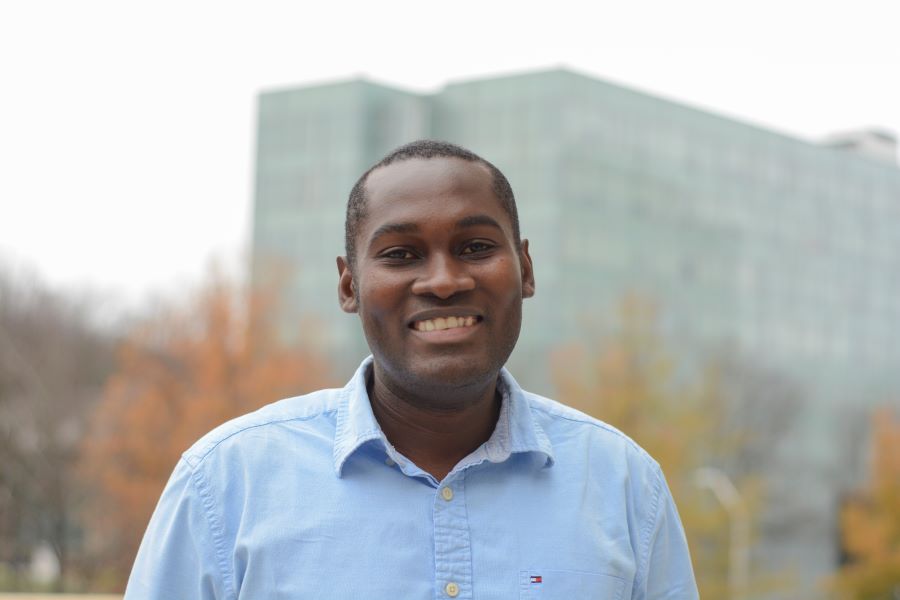Student Spotlight: Francis Baffour-Awuah Jr.

Francis Baffour-Awuah Jr. is a doctoral student in the Department of Mathematics, part of Florida State University’s College of Arts and Sciences. In the Biomathematics Graduate Program, his work focuses on biomathematics and computational biology. Baffour-Awuah Jr.'s research has been published in the National Library of Medicine from the National Center for Biotechnology Information, part of the National Institutes of Health, and he is in the fifth year of his doctoral program with plans to graduate in Fall 2024.
Tell us a little about your background, where you’re from and what brought you to FSU.
I was born in the United Kingdom, but I moved to Ghana with my family a year later. I come from a family of five, and I am the youngest of three children. I earned my bachelor’s degree in actuarial science from Kwame Nkrumah University of Science and Technology in Ghana and my master’s degree in mathematics from the University of Vermont. After obtaining my master’s degree, I applied to FSU and North Carolina State University, both of which offered a doctoral program in biomathematics. FSU granted me admission first alongside a teaching assistantship.
What inspired you to pursue a Ph.D. in biomathematics?
As an undergraduate student in actuarial science, even though I loved mathematical modeling and mathematics in general, the courses I was taking did not interest me. Then, in 2014 while serving as a teaching assistant at my undergraduate university, I was stuck in the middle of the Ebola virus epidemic. Even after the outbreak was under control, I never quite came to terms with the factors that contributed to its spread and impeded its containment especially in Guinea, Liberia and Sierra Leone. From that point, I developed an interest in a career that uses mathematical modeling as a tool to simplify complex problems in biology, biomedicine and infectious diseases.
What aspect of your areas of study do you find most rewarding? What lab do you currently work in?
My research concerns sepsis, a potentially fatal syndrome caused by a dysregulated response in someone experiencing infection. The pathophysiology of the condition is very complex to understand due to heterogeneity in patient populations. Therefore, my goal is to identify and investigate subgroups of septic patients, which will hopefully allow for treatment interventions to be directly tailored towards specific groups. I enjoy reading academic papers related to my work because they give me the opportunity to learn something new. I also appreciate not knowing what to expect when it comes to my work. I spend a lot of time trying out new techniques. I do most of my current research with professor of mathematics Nick Cogan.
What has been the most surprising thing you have learned through your research?
In Spring 2023, I took a class in immunology in which we learned about gene rearrangements as well as gene mutations and their effect on cells of the immune system. Subsequently, I read the article “HIV Immunity: Genetic Variation And Antiviral Enzymes Explain Why Some People Are Naturally Immune To HIV” and was surprised to learn that some people show partial or apparently complete innate resistance to HIV. This marvel of science inspired further curiosity in my own research on sepsis in hopes of finding solutions and various treatment options for patients experiencing the syndrome.
What on-campus resources have you utilized most during your time at FSU?
I have utilized both of FSU’s major libraries, Dirac and Strozier, the most during my time here. That is where I spend most of my time reading and working on research.
Are there any faculty or staff who have helped or inspired you? Why/how so?
I have been inspired most by my major professor, Nick Cogan, and Shaundra Lee, Dirac Science Library’s circulation supervisor. Among other things, Nick is patient and allows me to be myself and to share my honest opinions on our work together. Additionally, Shaundra is always smiling, and during the times I have gone to her for help while at the library, she has always responded with grace. I can tell she is very kind and respectful of students, so from a distance, she really inspires me.
What do you like to do when you’re not doing schoolwork or research?
I love to watch soccer and chat with my family and friends.
What advice do you have for fellow students?
Be proactive when it comes to your research, build relationships and network with others. However, don’t forget to spend quality time with family and friends.
Following your graduation, what are your plans? Even though you might miss FSU, what are you looking forward to once you graduate?
I am looking forward to continuing my career in biomathematics either in industry or academia. My long-term goal is to be a professor in biomathematics. I hope I find myself in a place where I can make the lives of others better.
